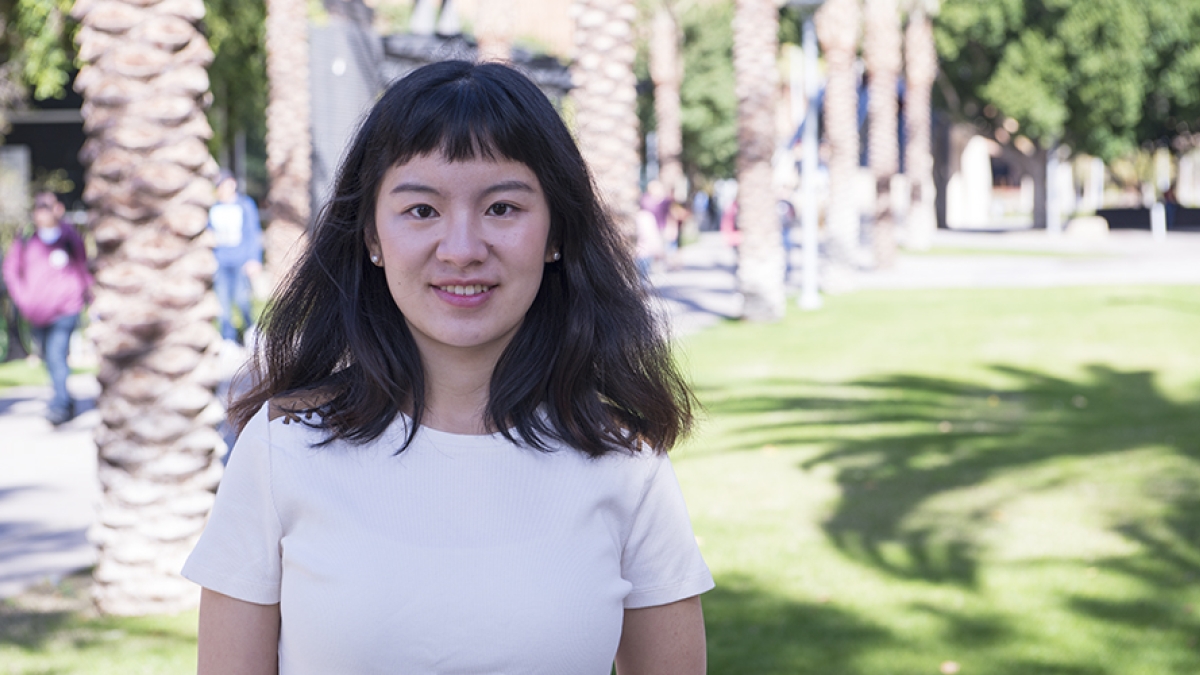Fascination with chemistry leads to biochemistry degree for School of Molecular Sciences senior

Nan Qiu, senior in the School of Molecular Sciences and Barrett, The Honors College.
Editor's note: This profile is part of a series of profiles showcasing students in the School of Molecular Sciences.
Nan Qiu, a senior in Arizona State University's School of Molecular Sciences and Barrett, The Honors College, has been around science her whole life. Qiu’s father is a zoologist, and her mother worked in the bioscience industry. With this background, she had a strong interest in studying biology from a young age. In 2013, at age 16, Qiu and her family moved to the U.S., and she enrolled at North High School in Phoenix.
At North High, Qiu not only learned a new language, English, but she also became intrigued with chemistry. So much so that biochemistry would become her major in college. Choosing ASU and the School of Molecular Sciences was an easy decision for Qiu — she could remain close to her family, the level of education she would receive was world-class in value, and the opportunity for research was immeasurable.
“Faculty reaching out to undergraduates to participate in research projects is great,” Qiu said. “You have a lot of support from the professors and that has had an impact on me.”
Qiu presented her research work at the American Society of Microbiology (Nevada and Arizona Chapter) Conference in March 2018 where she won the best undergraduate poster award. Notably, her work has also resulted in a first-author manuscript currently in preparation.
In May, Qiu will graduate. Afterward, she plans to pursue graduate studies in biochemistry, with a goal of becoming a professor one day at a university like ASU.
She answered some questions about her experience at ASU, and where she’s headed next.
Question: When did you first realize that you wanted to study biochemistry?
Answer: My mother and father both worked at an institute of zoology in my childhood, meaning I was pre-exposed to the biology part of my major as a child. After moving to the U.S., I was fascinated by the chemistry course with an integrated lab portion at North High School. That ultimately made me want to combine both sides of my interest and major in biochemistry.
Q: Why did you choose ASU?
A: A personal reason to attend ASU is its proximity to home: It’s just enough for a getaway, but I am still able to stay in close contact with my family. As a state university, ASU offered amazing financial support for quality education. In addition, ASU admits students and hires faculty from various backgrounds, and I believe meeting such a diverse group of people will have positive impact on a student's growth as an individual.
Q: What research opportunities have you had as a student here, and can you describe your research experience?
A: I study bacterial genetics in Dr. Rajeev Misra's lab. Specifically, I have investigated the regulation of iron-homeostasis in E. coli. Investigating the TonB-independent iron transport pathways, I showed that an E. coli TonB mutant with iron intake deficiency overcomes this defect by accumulating compensatory mutations. I found and mapped three of these mutations in the gene yejM, responsible for cardiolipin transport. In terms of applications, my work showed that these mutations disrupt the integrity of the membrane surrounding the cell making it supersensitive to some antibiotics which usually cannot enter the cell.
Q: What’s the best piece of advice you’d give to students interested in coming to ASU to study chemistry or biochemistry?
A: I advise new students to speak with faculty. Whether it's about a possible dispute on a question you are not sure on or asking for research opportunities, speaking with people who have been doing science for a living will definitely give you a new perspective about the field and may impact your future plans.
Q: What are your future academic and career plans?
A: After graduating this year, I plan to pursue a PhD in biochemistry with a focus on chemical biology. I have received invitations from Yale, Cornell and the Scripps Research Institute and will continue to explore my choices. In the long run, I hope to become a professor in a large, public institute — just like ASU — where I can stay active in research and educate students.
Q: Why is it important that the School provide scholarships or awards for its majors?
A: Scholarships and awards for majors not only work as financial supports but also positive feedback to the students. Especially for those who come from a disadvantaged background, scholarships for majors show that they can do just as well as others if they put in the extra hard work and dedication.
More Science and technology

ASU to host 2 new 51 Pegasi b Fellows, cementing leadership in exoplanet research
Arizona State University continues its rapid rise in planetary astronomy, welcoming two new 51 Pegasi b Fellows to its exoplanet…

ASU students win big at homeland security design challenge
By Cynthia GerberArizona State University students took home five prizes — including two first-place victories — from this year’s…

Swarm science: Oral bacteria move in waves to spread and survive
Swarming behaviors appear everywhere in nature — from schools of fish darting in synchrony to locusts sweeping across landscapes…

